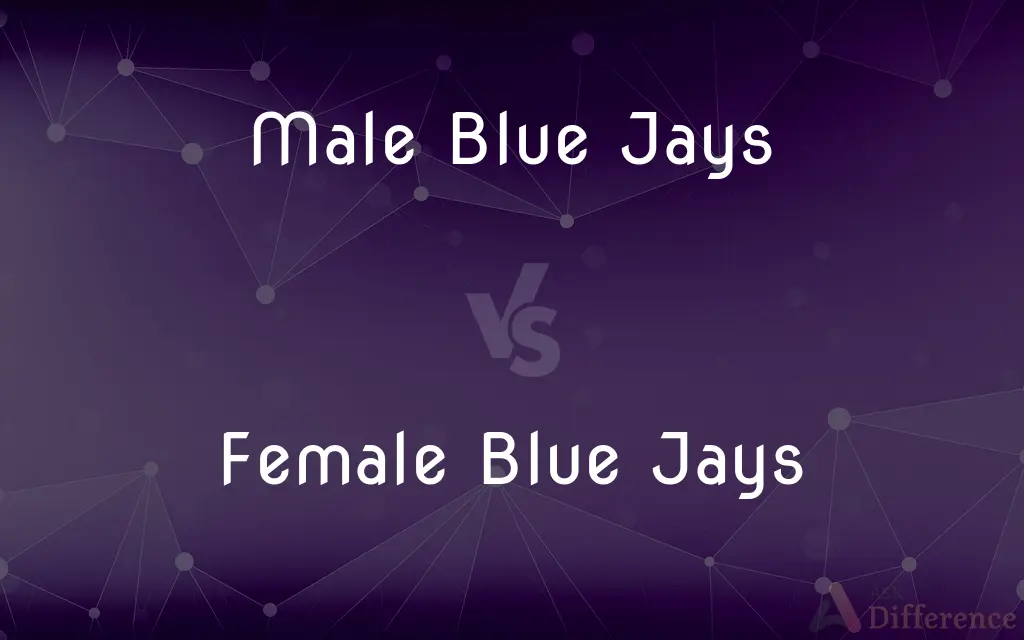Male Blue Jays vs. Female Blue Jays — What's the Difference?
By Tayyaba Rehman — Published on February 6, 2024
Male Blue Jays are slightly larger with brighter plumage, while Female Blue Jays are subtler in color and size. Both symbolize intelligence and communication.

Difference Between Male Blue Jays and Female Blue Jays
Table of Contents
ADVERTISEMENT
Key Differences
Male Blue Jays are known for their slightly larger size and more vividly colored plumage compared to Female Blue Jays. The males often display brighter blue and white colors, whereas females have a more muted appearance. Both, however, share the characteristic crest, blue, white, and black patterning, and striking appearance.
Male Blue Jays can be more aggressive and territorial, especially during mating seasons. In contrast, Female Blue Jays are generally less aggressive. Both sexes exhibit high intelligence and adaptability, often seen using tools and exhibiting complex social behaviors.
In nesting behavior, Male Blue Jays are involved in nest building but it's the Female Blue Jays who primarily construct the nest and incubate the eggs. Both take part in feeding and protecting their young, demonstrating a cooperative approach to parenting.
Male Blue Jays are often more vocal, using a variety of calls to defend territory or attract a mate. Female Blue Jays also communicate through calls but tend to be less vocal. Both sexes use their wide range of vocalizations for different purposes, including mimicking other species.
Both Male and Female Blue Jays play significant roles in their ecosystems. Males might be more visible due to their bolder behavior and brighter colors, but females equally contribute to seed dispersal and maintaining the ecological balance.
ADVERTISEMENT
Comparison Chart
Size
Slightly larger
Slightly smaller
Plumage Color
Brighter blue and white
More muted colors
Aggression
More aggressive, especially in mating season
Less aggressive
Nesting Role
Assists in nest building
Primarily builds and incubates eggs
Vocalization
More vocal and varied calls
Less vocal, though still communicative
Compare with Definitions
Male Blue Jays
Male Blue Jays are vibrant blue birds known for their intelligence and adaptability.
The Male Blue Jay skillfully used a twig to retrieve food from a narrow opening.
Female Blue Jays
Female Blue Jays primarily engage in nest building and egg incubation.
The Female Blue Jay meticulously constructed her nest with twigs and leaves.
Male Blue Jays
Male Blue Jays often exhibit territorial behavior, especially during breeding seasons.
The Male Blue Jay aggressively chased away intruders near its nest.
Female Blue Jays
Female Blue Jays communicate effectively through calls, though less frequently than males.
The Female Blue Jay used soft calls to communicate with her mate.
Male Blue Jays
Male Blue Jays are adept at mimicking the sounds of other birds and predators.
The Male Blue Jay confused birdwatchers by imitating a hawk's cry.
Female Blue Jays
Female Blue Jays contribute significantly to the ecological balance through seed dispersal.
A Female Blue Jay buried seeds, unknowingly aiding in forest regeneration.
Male Blue Jays
Male Blue Jays play a crucial role in seed dispersal and forest ecology.
The Male Blue Jay dropped acorns while flying, aiding in oak tree proliferation.
Female Blue Jays
Female Blue Jays are known for their nurturing behavior and subtle coloring.
The Female Blue Jay diligently fed her chicks in the nest.
Male Blue Jays
Male Blue Jays are notable for their bold plumage and loud calls.
A Male Blue Jay's call echoed through the forest, signaling its presence.
Female Blue Jays
Female Blue Jays are less aggressive but equally intelligent as their male counterparts.
A Female Blue Jay cleverly navigated her environment to avoid predators.
Common Curiosities
Do both Male and Female Blue Jays have crests?
Yes, both sexes have a distinctive crest on their head.
Are Female Blue Jays less colorful than Males?
Female Blue Jays have more muted colors compared to the brighter males.
Are Male Blue Jays more aggressive than Females?
Male Blue Jays tend to be more territorial and aggressive, especially during mating seasons.
How do Male Blue Jays attract mates?
Male Blue Jays use their vivid plumage and a variety of calls to attract females.
Can Female Blue Jays mimic sounds like Males?
Yes, both sexes are capable of mimicking sounds, though males are more frequently observed doing so.
Are Male Blue Jays bigger than Female Blue Jays?
Yes, Male Blue Jays are slightly larger than Female Blue Jays.
Who builds the nest, Male or Female Blue Jays?
Female Blue Jays primarily build the nest, though males assist.
Do Male Blue Jays participate in feeding the young?
Yes, both Male and Female Blue Jays feed and protect their young.
Are Male Blue Jays more visible in the wild?
Yes, due to their brighter plumage and bolder behavior, Male Blue Jays are often more noticeable.
Do Female Blue Jays have a role in seed dispersal?
Yes, both Male and Female Blue Jays play a role in dispersing seeds.
How do Male and Female Blue Jays communicate?
They communicate through a variety of calls and body language, with males being more vocal.
Do Female Blue Jays sing?
Female Blue Jays are less vocal but do make calls and sounds.
Are Male Blue Jays involved in incubating eggs?
No, Female Blue Jays primarily incubate the eggs.
Can you differentiate Male and Female Blue Jays easily?
It can be challenging as the differences are subtle, mainly in size and color intensity.
Do both Male and Female Blue Jays migrate?
Blue Jays are partially migratory, and both sexes may migrate depending on food availability and weather.
Share Your Discovery

Previous Comparison
Average Velocity vs. Average Speed
Next Comparison
FSI vs. FARAuthor Spotlight
Written by
Tayyaba RehmanTayyaba Rehman is a distinguished writer, currently serving as a primary contributor to askdifference.com. As a researcher in semantics and etymology, Tayyaba's passion for the complexity of languages and their distinctions has found a perfect home on the platform. Tayyaba delves into the intricacies of language, distinguishing between commonly confused words and phrases, thereby providing clarity for readers worldwide.














































